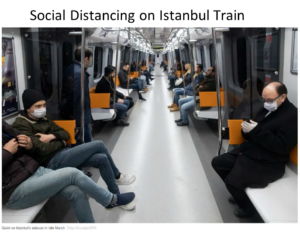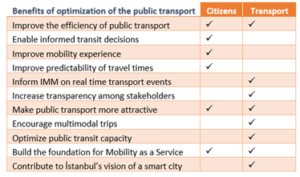
in 20Deploying AI and Predictive Analytics to Tame the City’s Infamous Traffic
Prosperity and steady immigration have severely stressed Istanbul’s transportation network. The population of 16 million has doubled over the last 20 years and continues to expand at nearly 3.5 percent annually. Narrow, hilly, and winding Byzantine-era lanes are choked with traffic, leading to continuous jams, transit delays, and sluggish logistics. Istanbul has the world’s fourth most congested metropolitan area and road traffic consistently ranks among its citizens’ greatest urban concerns.
Istanbul Metropolitan Municipality (IMM) dramatically expanded transport infrastructure capacity in recent years with major roadway, bridge, and tunnel construction but the car-centric strategy has only increased road traffic. Istanbul has 95,000 roads stretching 34,000 km and 3 million people use private cars for their daily commute. Average driving speeds in the central business district have fallen to 17.7 kph (11 mph) during peak hours, and the average driver lost 153 hours in traffic last year – about 50 percent more than drivers in the U.S. – a 6 percent rise in year-on-year traffic figures. Everyone scrambles for scarce parking which is estimated to be about 763,000 spots short of demand.

Like cities everywhere, Covid completely upended the municipality’s transport planning. Road traffic dropped a staggering 98 percent during the depths of the shutdown but subsequently recovered and surged 30 percent above pre-pandemic levels. When the Turkish economy officially reopened on June 1, 2020, traffic in Istanbul went haywire – a “completely unprecedented situation, even by Istanbul’s standards,” according to IMM’s Chief Information Officer, Erol Özgüner.
Recovery of public transit usage has been slow. Some 81 percent of Istanbul’s 8.5 million commuters rely on public transportation but seating occupancy was limited to 20 percent to enforce social distancing — lowering network capacity, slowing commutes, and brutalizing transit company revenues. Commuters remain fearful of public transport and many have simply become comfortable sitting in traffic in personal cars. Waiting queues to purchase a new car in 2021 reached five months in the big urban markets.
“After the pandemic, we believe that all commuter behavior will change,” says IMM Deputy Secretary General Ibrahim Orhan Demir, who leads the city’s transportation portfolio. “Cities have lost their memory. We do not have data for what might happen next.”
Investing in AI
Even before the pandemic, IMM began developing its Transportation and Traffic Excellence program, a comprehensive initiative to introduce advanced data science, artificial intelligence, and big data technologies to modernize traffic management and planning. IMM’s mayor, Ekrem İmamoğlu aims to accelerate Istanbul’s path toward a smart city with data-driven policymaking – and traffic management is a centerpiece of his digital transformation agenda. To implement its smart city vision, IMM expects to invest up to $180 million for digital systems and solutions over the next five years.
Istanbul’s Transportation and Traffic Excellence program will introduce latest-generation data analytics, artificial intelligence and machine learning solutions to better understand, forecast, and manage its urban traffic challenges. IMM expects the new digital platform will revolutionize how it can assess traffic conditions in real time, anticipate congestion trouble spots, and intelligently route traffic to guide citizens on their journeys.
At its core, the new urban digital platform will be powered by an AI engine provided by SAS (Cary, NC), the analytics software giant, through a pilot program funded by the U.S. Trade and Development Agency. The platform will ingest and analyze historical traffic data and live data feeds and decipher data patterns that can predict traffic anomalies and future flows. The analytic framework will be supported by an expanding array of digital cameras, sensors, data readers, mobile applications, payment gateways, and other devices. In addition, IMM is investing in a new data center to support expanding analytic processing requirements.
With traffic at the top of the municipal agenda, introducing digital best practices to improve congestion has cachet and ready political appeal. Data science and predictive analytics are expected to support the city’s sustainability goals, restore public confidence in mass transit services, and ultimately deliver improved traffic flow.
Program Focus Areas
The project targets both mass transit and road traffic. Adjusting bus routes with new traffic and passenger data is too complex for manual planning and the system will employ AI-based algorithms to run the math. The optimization models should improve the passenger experience through better quality of service and route availability, while boosting economic efficiency and reducing environmental footprint
Road traffic will similarly benefit. The system will anticipate traffic anomalies such as accidents, lane closures, and sudden areas of congestion in real time by analyzing route densities, driver behavior patterns, and point-to-point origination/destination journey maps. IMM will integrate the modeling data with road operations to control traffic signals and notify drivers through digital signage and mobile apps, a process that has begun.
Enhanced analytical data will accelerate Mobility-as-a-Service (MaaS) applications. Today a journey in Istanbul connecting a car or bus trip with a ferry ride, for example, cannot be linked in a common scheduling or payment app. Predictive data sets will help IMM introduce new (and supercharge existing) services that promote multi-mode transit options. To reduce dependence on private vehicles, the municipality is already rewarding multi-mode commuters with incentives paid directly to their Istanbul Card and catalyzing real behavioral change.
The pandemic has starkly revealed the importance of adopting data-driven strategies for urban sustainability and highlighted the centrality of transportation in digital reforms. To complement its investment in technology, Istanbul is also launching an Analytics Center of Excellence (COE) to boost overall data science skills and human capacity. IMM expects to integrate data-driven planning into all aspects of municipal operations, including at its energy, water, and waste management subsidiary companies, and further accelerate its digital transformation journey.
—-
IMM recently received a grant from the U.S. Trade and Development Agency (USTDA) to co-fund a Transportation and Traffic Excellence Pilot Project, with SAS (Cary, NC). A video interview between Istanbul Deputy Secretary Ibrahim Orhan Demir and Network Dynamics Associates president Ken Zita provides an overview of the program and can be found here. USTDA awarded a second grant to Istanbul to develop an Analytics Center of Excellence and disaster recovery data center. Network Dynamics designed both grants as well as related projects in Ankara and Gaziantep that launched USTDA’s U.S.-Turkey Next Generation Cities Initiative.
—-
Ken Zita is President of Network Dynamics Associates, a global technology and investment advisory firm that has conducted digital transformation projects in over 50 countries worldwide.
